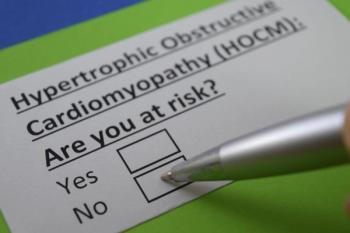
Bempedoic Acid for Hypercholesterolemia
An expert panel discusses where bempedoic acid currently fits into the treatment of hypercholesterolemia.
Episodes in this series

Dhiren Patel, PharmD, CDCES, BC-ADM, BCACP: I did want to mention about a recent approval of bempedoic acid. I know it exists as monotherapy and in combination. And so, maybe Dr Busch, what’s the role of that in your toolbox? When do you kind of use it? If you could talk to us a little bit about bempedoic acid.
Robert Busch, MD: So bempedoic acid blocks the pathway to generate cholesterol in the liver higher up than where a statin does. Statins are HMG-CoA blockers, and this is an ATP-citrate lyase blocker. So basically [it] stops cholesterol synthesis within the liver. The liver is hungry for cholesterol and upregulates the LDL [low-density lipoprotein] receptors. Which is what Brown [Michael S. Brown] and Goldstein [Joseph L. Goldstein] won the Nobel prize for in the 80s. It works higher in the pathway, but interestingly, it is not activated in the muscle, even though it’s activated in the liver so that it doesn’t affect the muscle cholesterol. There’s very little myopathy with the drug. The potential side effects are few. It can raise uric acid a little bit, so you have to be cautious if you give it to someone who’s had gout in the past. And there’s very rare cases of muscle rupture, although that’s not clear that that will happen. There’s no outcome study yet, the outcome study is in progress, fully recruited. It’s called the CLEAR-outcomes [Cholesterol Lowering via Bempedoic acid, an ACL-Inhibiting Regimen] study. And interestingly about that outcome study, the patients are either on no statin or very low dose statin. Very different than all of the other trials. Where the IMPROVE-IT trial, they were all on a statin. In the PCSK9 studies, they were on statins. And obviously the statin outcome studies were on statin. This will be 1 of the first studies in someone on no or low dose statin where a drug that is not a statin should show benefit. The LDL drop is about 18% monotherapy. And when it’s with ezetimibe [Zetia] as a combination drug, it’s about 38%, 40%. And those are patients already on a statin. If they’re not on a statin, can’t tolerate a statin, the drops might even be more. So personally, if someone’s on ezetimibe and their LDLs is not at goal and they can’t afford or close to LDL goal, I’ll upgrade it to the next—bempedoic acid with ezetimibe together. And the cost of it, to quote what Jen said, it’s a $10 copay for commercial insurance. It’s almost the same price as Dr Bhatt said for generic ezetimibe, and you get an extra 20% LDL. Again, there’s no outcome yet, but there [is] no reason you wouldn’t expect a positive outcome because it upregulates LDL receptors like all the other drugs that have outcomes.
Dhiren Patel, PharmD, CDCES, BC-ADM, BCACP: That's really helpful. And Dr Bhatt, I know Dr Busch just mentioned the outcomes are pending, but where does this fit into your toolbox? And maybe if you could kind of give it to us from a cardiology perspective, I think that would be helpful for the audience.
Deepak L. Bhatt, MD, MPH, FACC, FAHA, FSCAI, FESC: Sure. I think it’s a good question. Data to date of bempedoic acid looked good in terms of safety and in terms of efficacy, especially for that statin intolerant patient and when combined with ezetimibe, it seems to be respectable reductions in LDL cholesterol. Of course, in the cardiovascular community, we’re often looking for outcome trials and there is an ongoing outcome trial. And I think many cardiologists are really waiting for that before jumping on board. I guess I would see in terms of algorithms there’s outcome trial data for the PCSK9 inhibitors, the 2 monoclonal antibodies that are approved. So at least in my own, my algorithms typically statin, ezetimibe, PCSK9 inhibitor. And if the patient’s intolerant to statins, then ezetimibe, then PCSK9 inhibitor. And frankly, ezetimibe may not be doing that much with the PCSK9 inhibitor on board, but I usually still leave it in there. So that’s my typical algorithm. I think that once there’s outcome data for bempedoic acid, I probably feel more comfortable in its broader use. Right now, I think its use is probably, at least what I’ve seen in cardiology practices, more limited to patients who are statin intolerant. Ezetimibe doesn’t do the trick alone in terms of getting their LDL to go and they’re resistant to actually taking an injectable agent i.e. PCSK9 inhibitor. I must say, however, I’ve been surprised how few patients have objected to the injectable nature of the PCSK9 inhibitors. There were concerns that that was going to be a major barrier, but I haven’t actually seen that play out in clinical practice. Whether it’s a sort of a plus in terms of improving adherence, I haven’t necessarily seen that either, at least with the currently available PCSK9 inhibitors. Though there is a longer acting version inclisiran [Leqvio] that’s a bit of a different technology to monoclonal antibody technology where it could be given every 6 months for example, or even in some patients potentially if a lower degree of LDL lowering is required every year. Now, every year in terms of dosing, to me that could actually improve adherence, every 6 months potentially as well. But when the dosing interval is shorter, I haven’t necessarily seen an improvement in adherence from that versus oral therapies. But again, I haven’t seen such a resistance to injectable therapies as Dr Busch provided the anecdote. When you tell a patient that their LDL is dropped by 50%, usually that provides a lot of positive reinforcement to continue the PCSK9 inhibitor. So anyway, I see a much more limited role right now for bempedoic acid until the cardiovascular outcome data are available.
Transcript edited for clarity.
Newsletter
Pharmacy practice is always changing. Stay ahead of the curve with the Drug Topics newsletter and get the latest drug information, industry trends, and patient care tips.


























